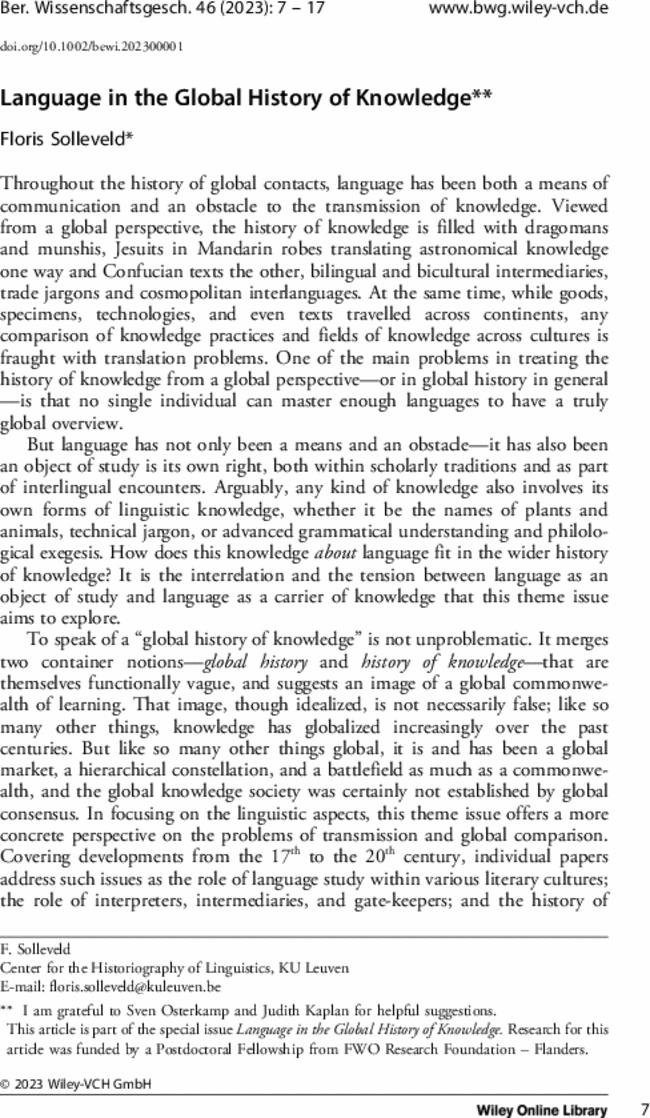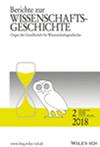Language in the Global History of Knowledge**
IF 0.4
2区 哲学
Q2 HISTORY & PHILOSOPHY OF SCIENCE
引用次数: 1
Abstract
Throughout the history of global contacts, language has been both a means of communication and an obstacle to the transmission of knowledge. Viewed from a global perspective, the history of knowledge is filled with dragomans and munshis, Jesuits in Mandarin robes translating astronomical knowledge one way and Confucian texts the other, bilingual and bicultural intermediaries, trade jargons and cosmopolitan interlanguages. At the same time, while goods, specimens, technologies, and even texts travelled across continents, any comparison of knowledge practices and fields of knowledge across cultures is fraught with translation problems. One of the main problems in treating the history of knowledge from a global perspective—or in global history in general —is that no single individual can master enough languages to have a truly global overview. But language has not only been a means and an obstacle—it has also been an object of study is its own right, both within scholarly traditions and as part of interlingual encounters. Arguably, any kind of knowledge also involves its own forms of linguistic knowledge, whether it be the names of plants and animals, technical jargon, or advanced grammatical understanding and philological exegesis. How does this knowledge about language fit in the wider history of knowledge? It is the interrelation and the tension between language as an object of study and language as a carrier of knowledge that this theme issue aims to explore. To speak of a “global history of knowledge” is not unproblematic. It merges two container notions—global history and history of knowledge—that are themselves functionally vague, and suggests an image of a global commonwealth of learning. That image, though idealized, is not necessarily false; like so many other things, knowledge has globalized increasingly over the past centuries. But like so many other things global, it is and has been a global market, a hierarchical constellation, and a battlefield as much as a commonwealth, and the global knowledge society was certainly not established by global consensus. In focusing on the linguistic aspects, this theme issue offers a more concrete perspective on the problems of transmission and global comparison. Covering developments from the 17 to the 20 century, individual papers address such issues as the role of language study within various literary cultures; the role of interpreters, intermediaries, and gate-keepers; and the history of

全球知识史中的语言**
本文章由计算机程序翻译,如有差异,请以英文原文为准。
求助全文
约1分钟内获得全文
求助全文
来源期刊

Berichte zur Wissenschaftsgeschichte
社会科学-科学史与科学哲学
CiteScore
0.80
自引率
16.70%
发文量
43
审稿时长
>12 weeks
期刊介绍:
Die Geschichte der Wissenschaften ist in erster Linie eine Geschichte der Ideen und Entdeckungen, oft genug aber auch der Moden, Irrtümer und Missverständnisse. Sie hängt eng mit der Entwicklung kultureller und zivilisatorischer Leistungen zusammen und bleibt von der politischen Geschichte keineswegs unberührt.
 求助内容:
求助内容: 应助结果提醒方式:
应助结果提醒方式:


